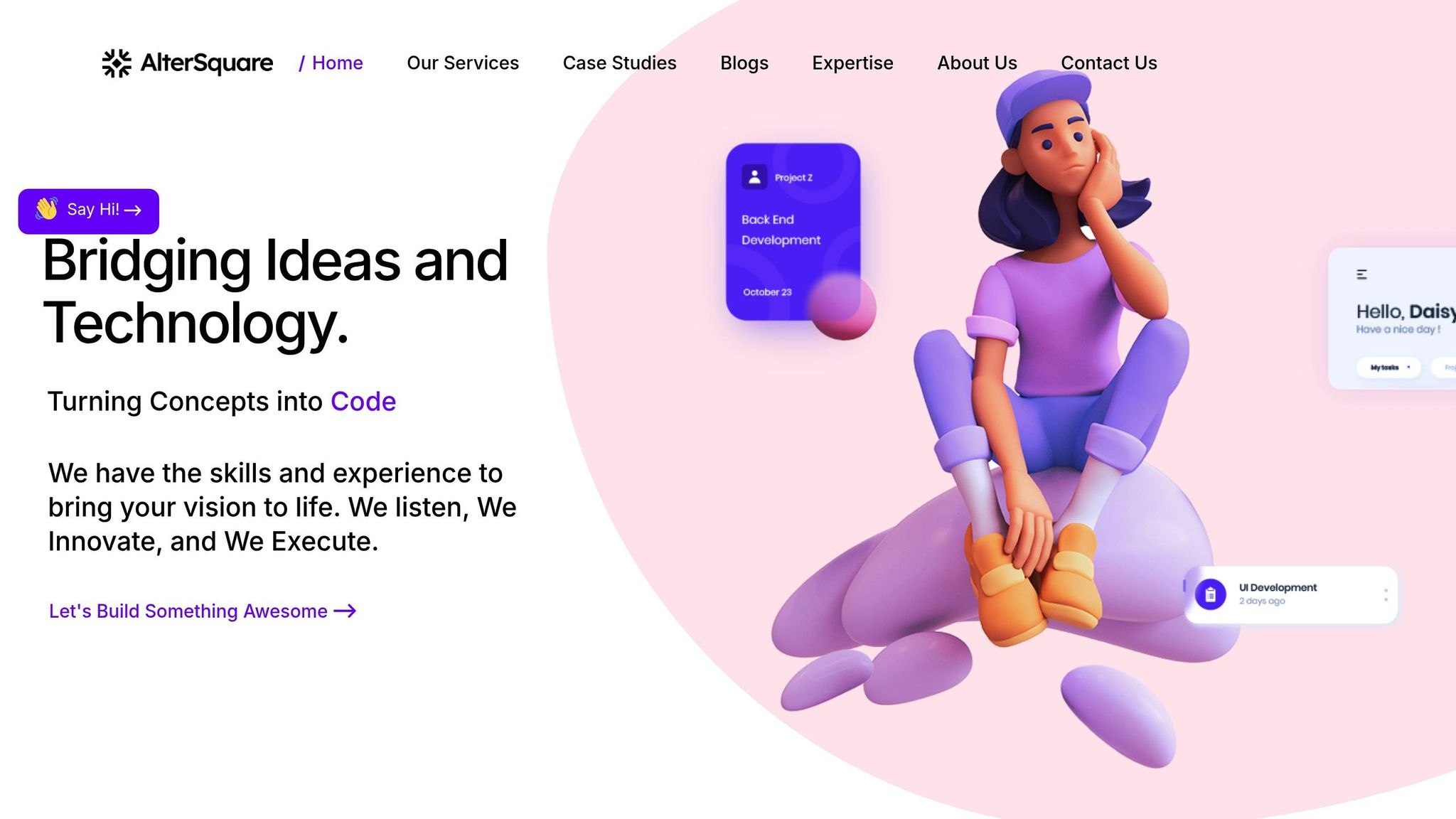Why Outsourcing Construction Software Development Makes Business Sense
Taher Pardawala September 8, 2025
Outsourcing construction software development can help companies save money, speed up product launches, and access specialized expertise. Here’s why it works:
- Cost Savings: Avoid the expenses of hiring, training, and maintaining an in-house team. Outsourcing turns fixed costs into flexible, project-based expenses.
- Faster Time to Market: Skip the delays of building an internal team. Outsourcing partners are ready to start, helping you deliver solutions quickly.
- Access to Experts: Outsourcing gives you access to teams with deep knowledge of construction workflows, compliance, and advanced technologies.
- Scalability: Easily adjust resources based on project needs without the hassle of managing a large in-house staff.
- Focus on Core Business: Let professionals handle the technical side while you focus on managing projects and growing your business.
Outsourcing is especially useful for startups and growing companies, offering a low-risk way to test ideas and build solutions without large upfront investments. With the right partner, companies can overcome challenges like finding skilled developers, managing costs, and ensuring quality, all while staying competitive in the evolving construction industry.
Main Benefits of Outsourcing Construction Software Development
Lower Costs and Better Budget Control
Outsourcing construction software development can significantly reduce expenses by cutting out the costs associated with hiring, training, and retaining full-time developers. Instead of dealing with the overhead of an in-house team, businesses can rely on fixed-price agreements or clearly defined hourly rates. This approach not only makes budgeting more predictable but also helps avoid the financial surprises that often come with internal development.
"Rising labor costs have pushed 85% of construction firms to explore construction outsourcing as a cost-effective strategy." [2]
Get to Market Faster
Managing costs effectively often translates to faster product launches. In the fast-paced construction technology sector, speed can be a game-changer. Outsourcing partners often come equipped with refined workflows, proven methodologies, and industry-specific expertise, enabling them to hit the ground running. For startups, this means skipping the lengthy process of building an in-house team and instead focusing on delivering products to market quickly, meeting customer needs and capitalizing on emerging opportunities.
Access to Expert Knowledge
Outsourcing opens the door to specialized expertise that might be hard to find internally, especially for startups or smaller firms. Construction software development demands a deep understanding of industry workflows, compliance requirements, and technical integrations – areas where external teams often excel. These teams bring a wealth of cross-disciplinary knowledge, covering everything from software architecture and user experience design to cutting-edge technologies like artificial intelligence and machine learning. Many outsourcing partners also stay up-to-date with the latest advancements, ensuring their clients benefit from the most current tools and practices.
"Outsourcing construction management allows companies to access a broad pool of industry experts with specialized knowledge and experience." – CDO Group, Inc. [1]
"Firms partnering with Stealth Agents report a 30% increase in operational efficiency." – Stealth Agents [2]
Easy Scaling Up or Down
Outsourcing offers unmatched flexibility, allowing businesses to adjust their development resources based on current needs. Construction projects often experience fluctuations due to seasonal demand or shifting scopes, and outsourcing makes it easy to scale resources up or down.
"When outsourcing construction management, companies can easily adjust their resource needs based on the project’s scope and demands. If a project expands or shrinks, outsourced firms can readily scale the team, providing the right number of experts at any given time." – CDO Group, Inc. [1]
Whether you need extra developers, designers, or specialists during a busy period – or need to scale back when priorities change – outsourcing ensures you have the right team size without the challenges of maintaining a large in-house staff. This adaptability ensures your projects stay on track regardless of market or business shifts.
Focus on Your Core Business
Outsourcing software development allows your internal team to focus on what they do best: understanding customer needs, building relationships, and driving business growth. By offloading the technical side of development, your team can prioritize strategies that directly impact revenue and market positioning. Recognizing that software development doesn’t need to be a core in-house function can free up valuable time and energy, helping your business stay competitive and agile in a demanding industry.
What to Consider When Outsourcing Construction Software Development
How to Pick the Right Outsourcing Partner
Choosing the right outsourcing partner for construction software development involves more than just technical expertise. You’ll want a partner who not only understands construction workflows, project management systems, and industry challenges like equipment tracking and safety compliance but also excels in communication and collaboration.
Communication skills are just as critical as technical know-how. Look for a partner who communicates clearly and proactively. Evaluate their response times, how well they explain complex concepts, and their ability to grasp your business needs without endless back-and-forth. Time zone alignment is another key factor, especially for U.S.-based companies that require real-time support during working hours.
A strong portfolio and proven experience are essential indicators of a partner’s capabilities. Review their past projects, especially those involving construction software. Pay special attention to their experience with mobile-first solutions – vital for field teams – and their ability to integrate with tools you already use, like accounting software, project management platforms, or equipment management systems.
Don’t overlook cultural alignment. A partner who understands American business practices, construction standards, and regulatory requirements will be better equipped to deliver a solution that fits your needs.
Finally, assess their team structure and stability. High turnover can disrupt your project and lead to repeated onboarding. Ask about their employee retention rates and how they handle knowledge transfer to ensure continuity if team members change.
Once you’ve selected a partner, focus on creating robust contracts and implementing quality assurance measures to set the stage for success.
Managing Risks and Ensuring Quality
Mitigating risks and ensuring quality in an outsourcing relationship starts with a solid foundation.
Clear contracts are the backbone of any successful partnership. Your agreement should outline deliverables, timelines, quality standards, and how changes will be managed. Include detailed requirements for code documentation, testing protocols, and handover processes. Make sure the contract defines what constitutes acceptable quality and includes measurable criteria for each milestone.
Intellectual property protection is another critical area. Your contract must clearly state that all code, designs, and project-related intellectual property belong to your company. Include non-disclosure agreements to safeguard your business processes, customer data, and competitive edge. Secure development environments and strict data handling protocols are also crucial.
To minimize risks, consider phased delivery. Breaking the project into smaller, manageable phases – starting with a Minimum Viable Product (MVP) – allows you to test core functions before adding additional features based on feedback.
Establish robust quality assurance processes from the start. Require automated testing, code reviews, and regular quality checkpoints. Define clear bug reporting procedures, resolution timelines, and acceptance criteria for every deliverable to avoid surprises.
Maintain visibility with regular monitoring and reporting. Weekly progress meetings, detailed status updates, and real-time project management tools can help you track development and address potential issues before they escalate.
Lastly, ensure compliance with U.S. regulatory standards, especially if your software handles sensitive project data.
Meeting U.S. Regulatory Requirements
Adhering to U.S. regulatory requirements is a critical step in developing construction software that’s secure and legally compliant.
Start with data privacy compliance. Your outsourcing partner should implement robust encryption, secure authentication protocols, and audit trails to protect sensitive data, especially for IoT systems, employee tracking, and client information.
Understand the industry-specific regulations that apply to your software. For example, federal construction projects may need to comply with the Davis-Bacon Act for wage tracking or Buy American provisions, while state-specific licensing and certification requirements vary. Your partner should be familiar with these nuances to avoid costly compliance issues.
Accessibility standards are another important consideration, particularly under the Americans with Disabilities Act (ADA). If your software will be used by a diverse workforce or customers, ensure it follows Web Content Accessibility Guidelines (WCAG) and accommodates users with varying abilities.
For software handling payroll, expense tracking, or financial reporting, financial and tax compliance is key. The application should integrate with accounting systems, support multiple tax jurisdictions, and maintain accurate audit trails.
Finally, prioritize security standards. Construction software often deals with sensitive project details or controls for connected equipment. Ensure your partner adheres to frameworks like the NIST Cybersecurity Framework or other relevant security standards.
Outsourcing Software Development: Pros and Cons
sbb-itb-51b9a02
AlterSquare‘s Approach to Construction Software Outsourcing

AlterSquare tackles the hurdles of in-house development by offering a refined outsourcing model known as engineering as a service. This approach creates an extended tech team that seamlessly integrates with your business. By doing so, it provides specialized expertise without the costs and complexities of maintaining an in-house team.
What sets AlterSquare apart is its focus on industry-specific solutions rather than generic development services. The company tailors its offerings to align with construction workflows and project management systems. For example, their solutions include features like tracking equipment, ensuring safety compliance, and designing mobile-first interfaces for field teams. This targeted approach not only amplifies the advantages of outsourcing but also directly addresses the challenges of in-house development.
Custom MVP and Quick Prototyping Programs
AlterSquare’s 90-day MVP program is designed to help founders quickly build and validate construction software ideas. With transparent pricing starting at $10,000, this program eliminates the need for large upfront investments and allows businesses to test their ideas in the market efficiently.
The program includes rapid prototyping sprints, delivering functional software versions within weeks. It also incorporates consulting on modern frameworks like Vue.js, Nuxt.js, GoLang, and Node.js, while leveraging AI tools to speed up development and cut costs. This is especially useful for construction software, as it enables real-world testing of features like progress monitoring for project managers, incident reporting for field workers, and maintenance logging for equipment operators.
A key element of this approach is the integration of continuous feedback loops. By gathering input from users early and often, businesses can validate assumptions and refine their product before committing to full-scale development.
Client Results and Success Stories
AlterSquare’s tailored MVP programs and engineering-as-a-service model consistently deliver measurable results. Case studies highlight how the company has successfully rescued struggling projects and delivered essential features on tight timelines. These efforts have translated into higher revenues, improved profit margins, and increased customer satisfaction.
Startups have particularly benefited from AlterSquare’s ability to prevent costly delays and capitalize on market opportunities. By addressing real-world challenges like minimizing project delays, improving safety compliance, and optimizing equipment management, AlterSquare helps businesses enhance both revenue growth and operational efficiency.
Every project is built on a scalable architecture that supports future growth. Whether a business is expanding into new markets, onboarding more users, or integrating additional tools, the technology is designed to handle increased demands without requiring a complete overhaul. AlterSquare’s track record demonstrates a consistent ability to deliver solutions that not only meet technical needs but also drive meaningful business outcomes for clients in the construction industry.
Common Problems and Best Practices in Construction Software Outsourcing
While outsourcing construction software development offers many advantages, it’s crucial to address the challenges that often arise and adopt strategies to ensure a smooth working relationship. Tackling these obstacles head-on can make a significant difference in the success of your project.
How to Handle Common Outsourcing Problems
Communication barriers are a frequent issue in outsourced projects, especially given the technical nature of construction requirements. Misunderstandings can occur, so it’s essential to establish clear communication protocols from the outset. Use tools like visual aids, detailed documentation, and schedule regular video calls to keep everyone on the same page.
Time zone differences can disrupt workflows, especially when urgent matters arise. To minimize delays, plan your project timeline to account for time zone gaps and set overlapping work hours for real-time collaboration when necessary.
Quality control concerns can emerge if your outsourcing partner lacks familiarity with construction industry standards. To address this, ensure the team is well-versed in industry norms by incorporating real-world scenarios during testing phases.
Scope creep and budget overruns are common risks, particularly when project requirements evolve mid-development. Construction software projects are especially prone to this as new needs surface. To manage this, define detailed user stories for various construction roles and lock in core features before development begins. Additionally, implement a formal change request process to handle new requirements in an organized way.
Best Practices for Working Together Effectively
To overcome these challenges, consider the following practices for a smoother collaboration:
- Regular status meetings and progress tracking: Schedule these during U.S. business hours and use shared project management tools for consistent updates. Daily standups can provide quick, actionable updates in terms that resonate with construction teams.
- Clear documentation standards: Create templates for user stories, technical specs, and testing procedures. Thorough documentation not only prevents confusion but also helps onboard new team members and supports future updates.
- Iterative feedback loops: Regular demos allow construction professionals to test features early, providing valuable feedback that can address usability concerns before they escalate into bigger issues.
- Data security protocols: Protect sensitive project data by implementing strict security guidelines. Confidentiality agreements, secure development practices, and regular security reviews should all be part of the process.
Outsourcing vs. In-House Development: Side-by-Side Comparison
| Factor | Outsourcing | In-House Development |
|---|---|---|
| Initial Cost | Lower upfront costs, especially for MVPs | Requires significant initial investment |
| Time to Market | Faster due to ready resources | Slower due to hiring and ramp-up time |
| Team Expertise | Access to specialized skills immediately | Expertise built gradually through training |
| Scalability | Flexible scaling as needed | Scaling is slower and more expensive |
| Control Level | Relies on strong communication and oversight | Direct management for higher control |
| Risk Level | Reduces financial risk but adds coordination challenges | Higher financial risk tied to internal resources |
| Ongoing Maintenance | Flexible support options | Requires dedicated internal resources |
| Industry Knowledge | Varies based on the outsourcing partner | Grows consistently with in-house experience |
This table highlights why outsourcing is often the go-to choice for early-stage construction startups. It offers a quicker path to market with lower costs and fewer resource commitments, allowing founders to focus on building their customer base and refining their business strategies.
As your software gains traction, the experience of managing an outsourced project can guide your future hiring decisions. By the time you’re ready to bring development in-house, you’ll have a clearer understanding of the technical expertise required, making the transition smoother and more strategic.
Conclusion: Why Outsourcing Makes Sense for Construction Startups
For construction startups aiming to create software solutions, outsourcing development offers an efficient path to success without the overhead and challenges of building an internal team. It provides lower upfront costs, quicker market entry, and instant access to specialized skills that could take years to cultivate in-house.
As the construction industry embraces digital transformation, startups that act swiftly to leverage this shift can gain a competitive edge. Outsourcing allows you to concentrate on what you do best – solving construction challenges and strengthening customer relationships – while experienced development teams handle the technical side of software creation.
Unlike in-house teams, outsourcing gives startups the agility and speed needed to test ideas, iterate quickly, and adapt to market feedback. It also reduces financial risk by avoiding the steep costs of hiring full-time staff before achieving product-market fit. Plus, outsourcing partners often bring proven processes that help avoid common mistakes.
"At AlterSquare, we bring to you an augmented tech team that sells engineering as a service! We work with start-ups to build bespoke MVPs." – AlterSquare
AlterSquare serves as an example of how modern outsourcing partnerships can function as an extension of your business. With fees ranging from $10,000 to $50,000 depending on team size and expertise, startups can access dedicated teams that seamlessly integrate with their operations – offering the control and quality of an in-house team with the cost-efficiency and flexibility of outsourcing.
Ultimately, the key to successful outsourcing lies in choosing the right partner – one that not only excels in software development but also understands the unique challenges of the construction industry. With the right partner, outsourcing becomes more than just a cost-saving measure; it’s a strategic collaboration that helps you navigate technical hurdles, accelerate growth, and focus on serving your customers.
For construction startups, outsourcing isn’t just a smart financial decision – it’s a way to fast-track innovation and scale your business.
FAQs
What should I look for in an outsourcing partner for construction software development?
When choosing an outsourcing partner for construction software development, start by examining their experience in the construction field and their history of successful projects. Take time to review their portfolio, read client testimonials, and explore case studies. This will give you confidence that they understand the unique challenges and needs of your industry.
You should also assess their technical skills and whether they have the ability to grow with your project’s demands. A good partner will communicate clearly, align with your objectives, and integrate well with your team’s working style. These elements are key to building a strong partnership and ensuring your software project is delivered smoothly and effectively.
How can outsourcing construction software development help startups reduce financial risks?
Outsourcing construction software development can be a game-changer for startups looking to manage their budgets wisely. By opting for external expertise, startups can skip the hefty expenses tied to hiring, training, and maintaining an in-house team. Plus, they save on infrastructure costs like office space and equipment – expenses that can weigh heavily on a young company’s finances.
Beyond cost savings, outsourcing opens the door to a global pool of skilled professionals. This means startups can tap into specialized knowledge and experience without stretching their financial limits. The result? Faster project completion, fewer risks of delays or budget overruns, and more room to concentrate on growth and innovation.
What are the main challenges of outsourcing construction software development, and how can businesses address them effectively?
Outsourcing construction software development comes with its own set of challenges. Common hurdles include communication gaps, differences in working styles, unclear project scopes, and concerns about intellectual property (IP) security. However, these obstacles can be addressed by selecting partners who excel in communication, share similar work practices, and have a proven history of successful projects. It’s also essential to define project requirements and expectations clearly from the beginning.
To tackle risks like quality issues or reduced control, businesses can adopt strategies such as conducting regular progress reviews, implementing thorough quality assurance measures, and ensuring secure handling of data. Carefully evaluating outsourcing partners, drafting detailed contracts, and maintaining consistent oversight are crucial steps in creating a smooth and effective collaboration tailored to the needs of the construction industry.








Leave a Reply